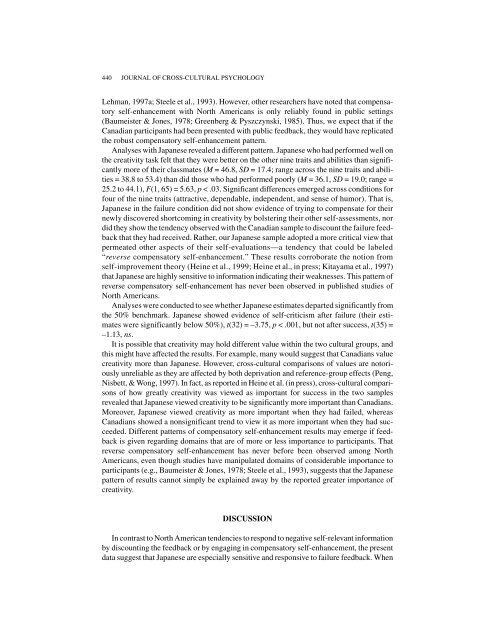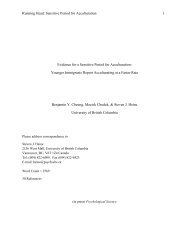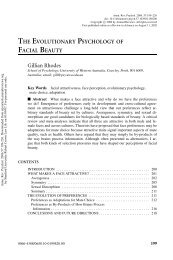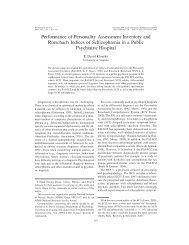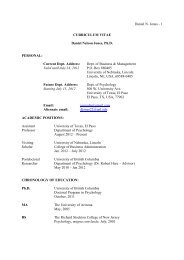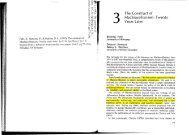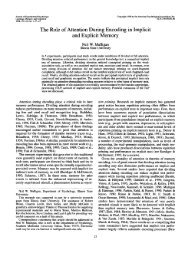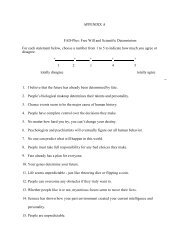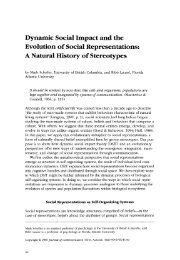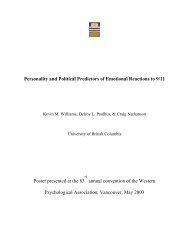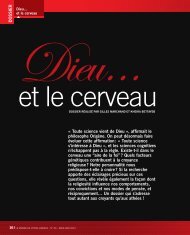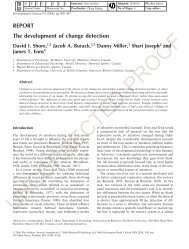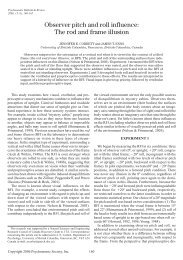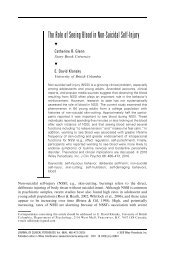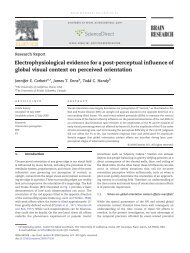CULTURAL DIFFERENCES IN SELF-EVALUATION Japanese ...
CULTURAL DIFFERENCES IN SELF-EVALUATION Japanese ...
CULTURAL DIFFERENCES IN SELF-EVALUATION Japanese ...
You also want an ePaper? Increase the reach of your titles
YUMPU automatically turns print PDFs into web optimized ePapers that Google loves.
440 JOURNAL OF CROSS-<strong>CULTURAL</strong> PSYCHOLOGYLehman, 1997a; Steele et al., 1993). However, other researchers have noted that compensatoryself-enhancement with North Americans is only reliably found in public settings(Baumeister & Jones, 1978; Greenberg & Pyszczynski, 1985). Thus, we expect that if theCanadian participants had been presented with public feedback, they would have replicatedthe robust compensatory self-enhancement pattern.Analyses with <strong>Japanese</strong> revealed a different pattern. <strong>Japanese</strong> who had performed well onthe creativity task felt that they were better on the other nine traits and abilities than significantlymore of their classmates (M = 46.8, SD = 17.4; range across the nine traits and abilities= 38.8 to 53.4) than did those who had performed poorly (M = 36.1, SD = 19.0; range =25.2 to 44.1), F(1, 65) = 5.63, p < .03. Significant differences emerged across conditions forfour of the nine traits (attractive, dependable, independent, and sense of humor). That is,<strong>Japanese</strong> in the failure condition did not show evidence of trying to compensate for theirnewly discovered shortcoming in creativity by bolstering their other self-assessments, nordid they show the tendency observed with the Canadian sample to discount the failure feedbackthat they had received. Rather, our <strong>Japanese</strong> sample adopted a more critical view thatpermeated other aspects of their self-evaluations—a tendency that could be labeled“reverse compensatory self-enhancement.” These results corroborate the notion fromself-improvement theory (Heine et al., 1999; Heine et al., in press; Kitayama et al., 1997)that <strong>Japanese</strong> are highly sensitive to information indicating their weaknesses. This pattern ofreverse compensatory self-enhancement has never been observed in published studies ofNorth Americans.Analyses were conducted to see whether <strong>Japanese</strong> estimates departed significantly fromthe 50% benchmark. <strong>Japanese</strong> showed evidence of self-criticism after failure (their estimateswere significantly below 50%), t(32) = –3.75, p < .001, but not after success, t(35) =–1.13, ns.It is possible that creativity may hold different value within the two cultural groups, andthis might have affected the results. For example, many would suggest that Canadians valuecreativity more than <strong>Japanese</strong>. However, cross-cultural comparisons of values are notoriouslyunreliable as they are affected by both deprivation and reference-group effects (Peng,Nisbett, & Wong, 1997). In fact, as reported in Heine et al. (in press), cross-cultural comparisonsof how greatly creativity was viewed as important for success in the two samplesrevealed that <strong>Japanese</strong> viewed creativity to be significantly more important than Canadians.Moreover, <strong>Japanese</strong> viewed creativity as more important when they had failed, whereasCanadians showed a nonsignificant trend to view it as more important when they had succeeded.Different patterns of compensatory self-enhancement results may emerge if feedbackis given regarding domains that are of more or less importance to participants. Thatreverse compensatory self-enhancement has never before been observed among NorthAmericans, even though studies have manipulated domains of considerable importance toparticipants (e.g., Baumeister & Jones, 1978; Steele et al., 1993), suggests that the <strong>Japanese</strong>pattern of results cannot simply be explained away by the reported greater importance ofcreativity.DISCUSSIONIn contrast to North American tendencies to respond to negative self-relevant informationby discounting the feedback or by engaging in compensatory self-enhancement, the presentdata suggest that <strong>Japanese</strong> are especially sensitive and responsive to failure feedback. When


